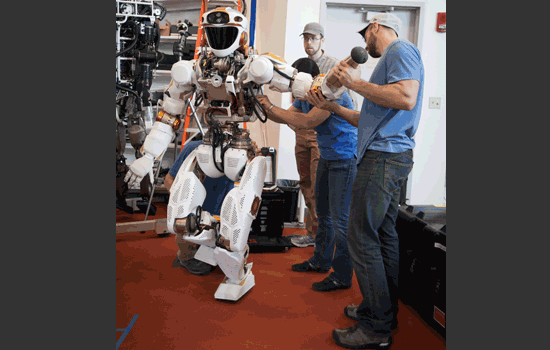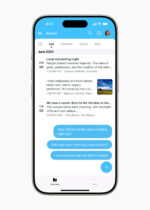
The 300-pound humanoid robot that NASA wants to use for space exploration has arrived at MIT’s Computer Science and Artificial Intelligence Laboratory (CSAIL) this week.
Researchers at CSAIL, led by CSAIL principal investigator Russ Tedrake will program their new “Valkyrie” robot to autonomously perform challenging tasks that would allow it to replace or help astronauts on a mission, according to a press release.
“Our work is about vetting the robot and seeing what it is capable of,” said Tedrake, whose team received a two-year research grant from NASA for the project. “If we can integrate the autonomy work with our planning and control algorithms, it could result in an unprecedented level of autonomous capabilities for a humanoid robot.”
The robot is fully electric, with four body cameras and more than 200 individual sensors, including 38 on each hand.
FBI decides to keep iPhone hack a secret
After much debate, the FBI has decided to hold onto the method it used to hack one of the San Bernardino shooters’ iPhone, instead of submitting it to a government review that would determine whether or not the FBI should share it with Apple, according to a report by Bloomberg.
According to Amy Hess, the agency’s executive assistant director for science and technology, the agency does not have enough technical information about a vulnerability that would “permit any meaningful review” by the Obama administration, she said in a statement.
The agency had bought a hacking tool from an unidentified entity and then used it to access data on the encrypted iPhone of a terrorist involved in the San Bernardino shootings, reported Bloomberg. The bureau then dropped the legal case against Apple and decided to use the tool instead of trying to gain Apple’s help in unlocking the iPhone.
Vue.js 2.0 announced
Vue.js is a library for developers to build Web interfaces, and while it is similar to a framework, its creators said it’s more like a set of optional tools that work well together. Yesterday, Vue.js 2.0 was released, bringing along new improvements and features.
Version 2.0 is faster, since the rendering layer is now based on a lightweight virtual-DOM implementation that improves the initial rendering speed and memory consumption, according to a blog post by team member Evan You.
The virtual-DOM is combined with Vue’s reactivity system, so it provides “optimized re-rendering out of the box,” he said. Also, Vue 2.0 applies advanced optimizations during the template-to-virtual-DOM compilation phase.
For developers who prefer to write interfaces in templates, but also like the flexibility of JSX/hyperscript, Vue 2.0 allows them to use the familiar template syntax or drop down to the virtual-DOM layer whenever a developer feels constrained, according to You.
The FTC is investigating Android
The FTC is reportedly expanding its investigation into Android over fears that Google is exploiting its current position in the smartphone market, according to the Verge.
The FTC has been meeting with companies that are expressing their concern with Android, and they will discuss how the market share of Android is being used (or misused) against others, reported the Verge.
Also, the FTC is reportedly looking into similar complaints like whether or not Google is disadvantaging non-Google services on the operating system. This investigation may never lead to legal action against Google, reported the Verge.
Apple open-sources CareKit
Apple has open-sourced CareKit, a framework for developing apps that let users understand and manage medical conditions.
This framework allows developers to build apps that manage users’ medical conditions so they do not have to rely only on doctor visits. With these apps, users would be able to regularly track symptoms and medications, and share information with a care team.
Currently, developers are already using CareKit. Soon, apps that incorporate CareKit modules like Care Card or Insight Dashboard will also be available to users.
CareKit can help manage chronic conditions, diabetes, and help user’s reveal what treatments will work. Also, CareKit has the option of controlling what research studies a user can join, and how they can control the information provided to specific apps.






